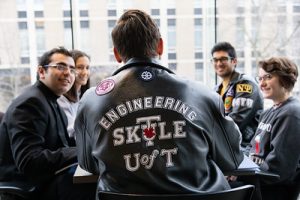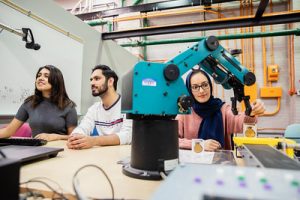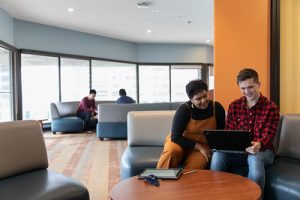36 days left, just over a month to go!
As a personal update, I picked the first ripe red tomato in my garden this morning, it was a proud quarantine moment 🙂
Good day everyone and welcome back to the blog!
This week I wanted to get readers excited and looking forward to opportunities that you’ll be able to explore in the summer after your first year here in U of T Engineering. You in no way need to be worrying about your plans for Summer 2021 at this moment in time (focus on the excitement of starting Engineering!), but I know many of you have been asking about what sorts of summer opportunities exist for first years, so I figured I would spend this week going over what’s out there and clear up any misconceptions. I’ll also be sharing my personal experiences in the past two summers that I’ve been in Engineering.
*** A quick clarifying note:
In addition to completing all the course requirements of your Engineering program, in order to graduate here from the Faculty you’ll also need to complete a minimum of 600 hours of practical work in an Engineering field. This could be working at a company or even doing research in an engineering research lab. So as I’m going through my list, if I mention anything related to “getting your 600 hours”, that is what I’m referencing.
Let’s get started:
Summer Courses
While you can’t really take any of your core courses during summer, you can absolutely take elective courses. Throughout your time in U of T Engineering, you’ll need to take a certain amount of Complementary Studies electives in order to graduate, which are electives that aren’t related to your program or sometimes even related to the field of STEM at all. Many students choose to get these courses out of the way in the summer, freeing up spaces in their Fall and Winter timetables to take more of what are called “Technical Electives” that relate to your program and don’t run as frequently in the summer. Taking summer courses is also beneficial if you’re trying to pursue a minor and can’t fit those extra needed courses into your regular timetable.
Fellow First Year Office summer student Sarah and I have both been taking APS360 this summer. I chose to take it because I knew I’d have a lot more spare time this summer while Toronto was in quarantine and I also needed the course for my minor so it was very convenient in that sense. The classes run in the evenings so I’m able to have the daytime to study and work, as well as maximize the time I spend outdoors while the sun is still out (I’ve still got to keep the veggie garden dream alive). I’ve really enjoyed taking a course over the summer, for one thing because there’s a large programming component to it with lots of lab work so I’ve been able to learn the concepts at my own pace without being distracted by other coursework. It’s also been nice to take the course with my friends who moved out of Toronto since we can call each other more to talk about homework and catch-up together. I will say I did find it hard at times to get myself to study and focus on account of the nice weather and being back home in a house full of family members. However if you’re expecting to have a pretty uneventful summer after first year and are looking for something to keep you busy, certainly talk to your Academic Advisor next spring about taking summer courses. Summer courses do cost extra from the standard tuition you pay for the Fall and Winter semester. The fees for Summer 2021 won’t be released until some time next Spring.
Work-Study
Another feature that I think really sets U of T apart from other schools is just how comprehensive its Work-Study program for students is. If you’re enrolled in classes you’re eligible to apply for a job during that particular semester at the University to “work” and “study” (attend classes) at the same time. It’s very convenient for Engineering students because you’re only allowed to work up to 15 hours a week in order to give you time for classes and extracurriculars. The program also prioritizes your studies, meaning they ensure you never have to miss class for work, which could happen if you took a part-time job elsewhere.
You also aren’t restricted to only apply for work-study jobs in your Faculty. Before I was offered my work-study position here in the First Year Office, I also interviewed for a position at the U of T Scarborough campus. There are hundreds of work-study positions available in the job portal during the summer, so if you’re looking to develop some skills over the summer while taking courses, I would definitely recommend applying for a work-study.
Summer Research
A lot of students choose to study at U of T because of its world-renowned research spaces. Each of the Engineering departments has its own research labs and programs that provide opportunities for undergraduate students to take part in summer research. If the research also relates to a field of Engineering, any work done can count towards your 600-hour requirement.
A popular assumption I hear a lot from incoming Engineering students is that you need a high GPA to find a research position after first year. Not necessarily true! While it’s always nice to be able to support any job application with a strong academic record, faculty members know that first years have a hard time adjusting to the new environment, and past data show that first year academic performance is not always a reliable indicator of overall performance of an Engineering student by the time they graduate. Students also assume you need to have prior research experience in order to be hired right after first year – also not true! Again it’s something that’s nice to have, but doesn’t play as much of a role in hiring decisions for first years. So what should you do to maximize your chances of getting a job if you don’t have the highest grades or prior experience? This advice was passed down to me from upper year students so I’m happy I get to share it with you. I need to first explain how first year students typically apply for research opportunities in Engineering:
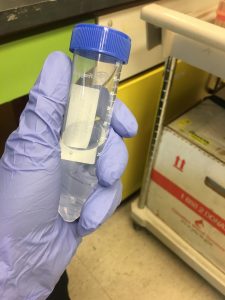
One good way to learn about research is to ask your course instructors and TAs! I mentioned this in an earlier post, but going to Office Hours is a great way to get to know your instructors better and learn about the research many members of our Faculty are involved with on a daily basis. If you’re interested in the work they’re doing and think you’d enjoy learning more about it long-term, you can find a time to kindly ask if they take students in the summer, and go from there. Fair warning: A lot of professors cannot take on first year or summer students at all for logistical or financial reasons even if they wanted to. So if that’s a reason they bring up when they say no, don’t feel too bad — it’s a reality for a lot of research labs. However, if they can take first year students, they might ask you to meet with them to chat more, or ask to email them a resume or a paragraph describing your qualifications and interests. There are also formal research programs you can apply to like ESROP (specifically for EngSci students), and the First Year Summer Research Fellowship. If you plan to live in your home city or country next summer you can also reach out to professors at a local college or university and see what opportunities exist there.
One way to set yourself apart is to use your resume or interview as an opportunity to share more about yourself and why you’d be a good fit. Each of you is about to start taking challenging and exciting courses in math, science and design. There will be plenty in that alone to talk about. Maybe you did a computer lab that sparked your interest in software, or a physics lab that made you want to learn more about laboratory experiments. A good example you might consider to bring up will be the project you work on in your APS111: Engineering Strategies and Practice (T1 and Core8) or ESC101: Praxis (EngSci) design courses. There, you’ll be working in a team to tackle a design challenge with a real customer stakeholder. A lot of experiences you have in that course provide a framework for developing as an engineering student, making it a great example to bring up if you get asked why you would be a good research student. You can also talk about any extracurriculars you end up getting involved in this year (see my earlier post about getting involved); design teams especially! If you join a design team you’ll find yourself learning a ton of new technical skills that are great to share with research professors.
I spent my summer after first year as a research student in the McGuigan Lab for Tissue Architecture, Patterning and Microenvironment Design. I spent most of the interview talking about how much I enjoyed designing a proposal for a medication storage device in my Praxis 2 (ESC102) course and why that interested me because I wanted to pursue biomedical engineering in university. As someone who didn’t have the best grades after first year, I think being genuinely interested in the lab’s work and sharing why I thought I would be a good research student ultimately led to me working there for the summer.
Summer Internship
While not as common as the other opportunities I’m listing, some students after first year do choose to pursue a part-time or full-time summer internship. Internships, if related to a field of engineering, can count towards your 600-hour requirement. A lot of questions I’ve heard from you all have been about whether it is easy to find an internship position after your first year, so I’ll share what I’ve come to know over the years. There are certainly fewer jobs open to first year students, but that doesn’t mean they don’t exist. Sometimes, with companies that really don’t take summer students, it’s possible to make an arrangement just to shadow an employee for a few days or weeks. Then you’re able to get a feel for what it’s like to work at that company, in that industry, and to better inform your decisions when you graduate and start to work full-time. Some companies might also have GPA requirements, especially for the more popular ones.
A good place to start looking for jobs (I would say around Winter break to give yourself a head start) is the U of T Career Learning Network. They’ve got a job portal open year-long only to U of T students, and breaks down postings both geographically and by the field of work to make it easier to find job postings you’re interested in. I’ll also link the PEY webpage for your reference, even though you can’t use this resource until 3rd year when you actually start applying for Co-op positions.
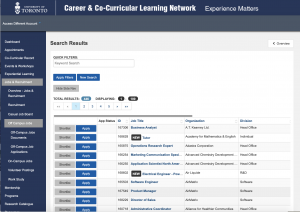
Another good resource you can start utilizing is Skule’s own You’re Next Career Network (YNCN). YNCN runs both a fall and winter career fair where historically 60+ employers have shown up and had booths where you can speak to recruiters and find out directly from companies about the opportunities they might have for first year students. Throughout the year they also run various networking and career development events where specific companies come to campus and get into more detail about their workplaces and recruitment cycles. These YNCN events, including the career fairs, will be running remotely this year. I’ve been told they’re going to be just as exciting, and employers apparently cannot wait to try out this new format of networking.
Volunteering and Leadership Development
You also might be interested in spending the summer focusing on your personal growth and leadership development. ILead has two summer programs specifically for that: the FIELD Summer Program and their famous Summer Fellowship. I’ve had the chance to try both of them and I can honestly say they’re worth the time, especially as you get to meet more students in other Engineering disciplines. Many of the facilitators who work at ILead and who run the program were also U of T Engineering students at one point too, so it’s nice to get to chat with them about their own undergraduate experiences in a more casual setting.
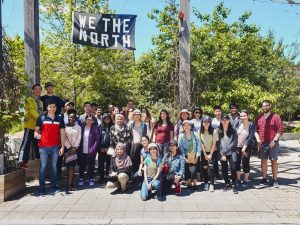
If you’re looking ahead at possibly volunteering for the summer, a popular opportunity is through Engineers Without Borders and their summer fellowships where you can travel to a partner country in the continent of Africa and participate in a leadership and entrepreneurship program with students there. Definitely reach out to the co-presidents of the U of T EWB chapter if you want to learn more. Current and past U of T Engineering students have raved about their experiences abroad in those fellowships.
Relaxing
You’ve got four whole years to get your 600 hours completed. Many first year students choose simply to spend the summer unwinding and getting ready for their second year ahead, and that’s totally okay! Lots of my friends took that summer to travel and visit relatives, or even tour a new country with friends they met that year in Engineering. There’s absolutely no rush to finish all your hours in the first summer, you’ll have plenty of time.
Ultimately how you spend your summer is up to you, so look at all your options and consider all opportunities. And remember, summers are to be enjoyed! By the time you finish your first year, you’ll probably just want a nap before anything else…
Before I sign-off, a quick message from this year’s F!rosh Week team:
*******
You may be wondering, what is F!rosh Week (Orientation) going to look like this year?
F!rosh Week is going to be held online this year (September 7th-13th), so you can join us wherever you are and have an amazing time!
Register and get more details here at https://orientation.skule.ca ! You’ll get to connect with your F!rosh group (#HYPE), get access to your F!rosh Kit, which includes your (very important) hard hat! Register before August 4th to guarantee your kit before F!rosh week begins.
Check out our social media platforms to stay updated! https://froshweek.carrd.co
*******
That’s all for this week, see you soon!
Mirjana
Lingo Legend:
Core Courses: Courses you have to take in order to complete the degree requirements for your program. All your first year courses are designated as core courses. All other courses (courses you yourself can choose), are considered electives.

